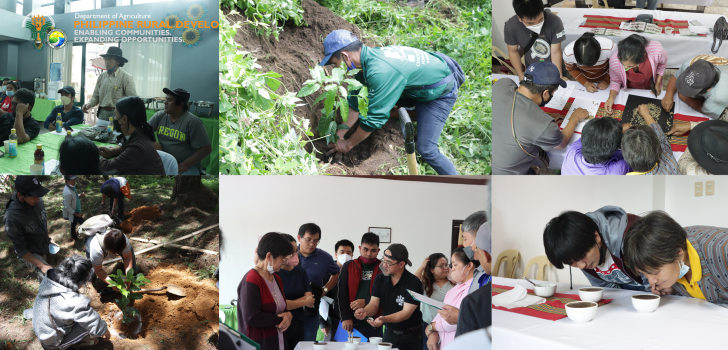
GAP for quality coffee production strengthens Proponent Groups in Benguet
The training series on Good Agricultural Practices (GAP) for quality coffee production of specialty arabica was continued in two batches for the Proponent Groups (PGs) of the Benguet Arabica Coffee Enterprise (BACE), a subproject implemented under the Department of Agriculture-Philippine Rural Development Project (DA-PRDP).
Held from June 14-16 and June 21-23, the farm-to-cup coffee learning was conducted in partnership the Agricultural Cooperative Development International/Volunteers in Overseas Cooperative Assistance (ACDI/VOCA) – Philippine Coffee Advancement and Farmers Enterprise (PhilCAFE) Project and the Philippine Coffee Guild-Coffee Collective of the Philippines (PCG-CCP), to develop the knowledge and skills of the PGs on proper coffee production management protocols to improve coffee quality and produce higher incomes.
Additionally, the GAP training intends to introduce and cascade the Coffee Mentorship strategy of the PhilCAFE to the PGs in order to achieve a wider reach of farmers in the use of appropriate practices; provide an experimental method of learning and adoption of farming practices and technology for coffee farmer beneficiaries and project implementers; and capacitate the farmers to qualify and enter local/international coffee competition to add more value for their coffee beans.
In his message, DA-PRDP National Project Director Undersecretary Ariel T. Cayanan said that the partnership between the PCG-CCP and ACDI/VOCA-PhilCAFE Project intends to increase coffee production through capacity building activities that will improve productivity and yield higher incomes for coffee farmer beneficiaries.
As part of the training program, the following modules were discussed: coffee establishment care and maintenance; plant nutrition/fertilization; integrated pest and disease management; pruning and rejuvenation; farm planning; proper coffee harvesting and characterization; coffee postharvest processing methods; and green bean grading and cupping.
The discussions were complemented with field practicums and actual demonstrations particularly on field lay-outing and planning, planting of coffee seedlings, care and maintenance, pruning and rejuvenation, green bean grading, and cupping.
Following the GAP on planting coffee seedlings, the trainees planted more than 20 arabica coffee seedlings at a coffee farm located in barangay Shilan, La Trinidad, Benguet (for Batch 1) and at the DA-Baguio Animal Breeding and Research Center (BABRC) in Baguio City (for Batch 2).
A bonus topic on the preparation of biological control agent such as the Beauveria Bassiana and the preparation of Coffee Berry Borer (CBB) trap were also demonstrated by PhilCAFE Project Senior Field Technician Razul Dakiwas, PhilCAFE Coffee Mentor Brian Mendoza, and DA-RFO-CAR Integrated Laboratories Division (ILD) Agriculturist Allan Cadiente.
In the non-availability of the PCG-CCP, the coffee cupping and sensory exercises were then facilitated by the Cordillera Quality Coffee Association (CQCA) led by CQCA President Ollie Thor Fonite. The activity was intended for the participants to appreciate the cupping process and expound their knowledge on the cup taste and quality of coffee from various areas.
The second phase of the GAP training which will focus on hands-on proper coffee harvesting and processing methods, is scheduled to be conducted on November 2022.
Participating PG representatives are from the following: Atok Arabica Coffee Growers Marketing Cooperative (ACOGMAC), Abiang Community Multipurpose Cooperative (ACMPC), Bobok Bisal Organic Arabica Coffee Producers and Growers Association, Inc. (BBOACPGAI), Kibungan Arabica Coffee Growers MPC (KCGMPC), and Kapangan Arabica Coffee Producers Association (KACPA) for the first batch; and Tuba Benguet Coffee Growers Association, Itogon Agriculture Cooperative, Tublay Organic Farmers and Producers Cooperative (TOFPA), La Trinidad Arabica Coffee Producers Association (LATACPA), Bakun Central MPC (BCMPC), and Banangan Coffee Growers Association (BCGA) for the second batch. Representatives from the DA-Baguio Animal Breeding Research Center (BABRC) also participated in the training. Elvy T. Estacio (RPCO-CAR Writer)
